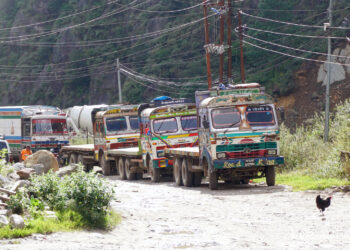Khabarhub brings you a glimpse of major developments of the day in Nepal, including politics, business/economy, sports, entertainment, and more.
Saurya Airlines crash: 18 out of 19 onboard confirmed dead
Eighteen out of the 19 people aboard the ill-fated Saurya Airlines flight that crashed at Tribhuvan International Airport (TIA) in Kathmandu, Nepal, on Wednesday morning have been confirmed dead, according to Civil Aviation Authority of Nepal (CAAN).
According to sources at Tribhuvan International Airport, the aircraft (9 N-AAMI) crashed during takeoff, causing it to skid off the runway and catch fire.
The incident occurred as the plane was departing from Kathmandu to Pokhara.
Govt forms probe commission following Saurya Airlines plane crash
A probe commission has been formed in response to the tragic Saurya Airlines place cras that killed 18 people onboard.
An emergency meeting of the Cabinet held at Singha Durbar on Wednesday evening resulted in the formation of a 5-member commission, led by Ratish Chandra Lal Suman, former Director General of Civil Aviation Authority of Nepal (CAAN).
Minister of Communications and Information Technology, Prithvi Subba Gurung, announced the Commission’s mandate to investigate the incident thoroughly.
The committee, chaired by Karna, has been tasked with submitting its findings within 45 days, along with recommendations to prevent future occurrences.
Diplomatic efforts underway to repatriate Nepalis serving in Russian Army: Foreign Minister Rana
Foreign Minister Dr. Arzu Rana has revealed ongoing diplomatic efforts aimed at repatriating Nepali citizens currently serving in the Russian Army.
Speaking at a meeting of the International and Tourism Committee of the House of Representatives on Wednesday, Minister Rana provided updates, stating that 34 Nepali soldiers had lost their lives, while 6 were currently held as prisoners in Ukraine.
She emphasized that diplomatic measures were being actively pursued to facilitate the swift return of other Nepali nationals from the Russian Army.
NEPSE drops by 27.32 points following 6-day surge
The Nepal Stock Exchange (NEPSE) Index concluded today’s (Wednesday) trading at 2,536.11 points, marking a decline of 27.32 points or 1.06% compared to the previous day’s close.
This comes after a substantial gain of 75.33 points yesterday.
Today’s trading day started with the index opening at 2,573.23 points.
Throughout the day, it fluctuated between an intraday low of 2,513.43 points and a high of 2,600.41 points, yet ultimately settled at its closing figure.
Bagmati Province CM Bahadur Singh Lama sworn in
Bahadur Singh Lama has been sworn in as the Chief Minister of Bagmati Province today. The oath-taking ceremony was conducted by Province Chief Yadav Chandra Sharma.
Chief Minister Lama wasted no time in forming his cabinet, announcing a 10-member team on the same day.
According to Govinda Prasad Poudel, Spokesperson at the Province Chief’s Secretariat, CM Lama also administered the oath of office and secrecy to the newly appointed ministers.
Prachanda highlights Maoist Center’s contribution to good governance
Chairman of Maoist Center, Pushpa Kamal Dahal ‘Prachanda’, asserted that the party’s departure from the government has left a lasting impact on the promotion of good governance.
Speaking at a program in Kathmandu on Wednesday, Dahal emphasized that their exit from power was untarnished.
According to Dahal, the Maoist Centre-led government was abruptly toppled in a non-transparent manner while actively pursuing goals such as enhancing good governance, ensuring social justice, and fostering economic prosperity.
NHRC urges against appointment of controversial figures to public office
The National Human Rights Commission (NHRC) has called upon the Constitutional Council and state agencies to refrain from appointing individuals embroiled in social and moral controversies.
In a statement issued Wednesday, NHRC spokesperson Tikaram Pokharel emphasized that appointing socially and legally contentious individuals undermines the rule of law, fosters impunity, and erodes public trust in state institutions.









Comment